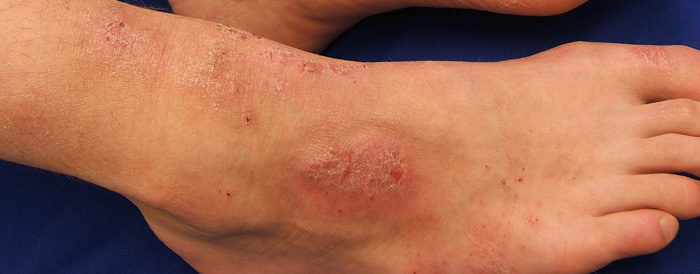
How to Treat Eczema and Dry Skin ‘Winter Itch’
As temperatures drop across the country it becomes the season for warm sweaters, snowmen, and roaring fires, but for some people the return of winter can also mean searching for a way to treat eczema as they experience the return of dry, itchy skin and irritating rashes.
These symptoms are common in people with sensitive skin and allergies, and are often aggravated by the cold, dry air and severe temperatures of the season. Symptoms can also be triggered or worsened by a person’s behavior and choices, such as what clothing they wear or even their morning routine. Thankfully, people who suffer from winter rashes can modify their behaviors and take steps to treat winter eczema and soothe a flare up.
What is eczema?
Eczema is a chronic skin disease in which patches of skin become irritated or inflamed, causing itching and the formation of rashes or blisters. Eczema can occur secondary to loss of skin moisture or even due to a reaction to an irritant or allergen, but oftentimes there is not a clear external cause. Atopic dermatitis (also called atopic eczema) is a common type of eczema often associated with a hypersensitive reaction to an allergen. Patients with atopic dermatitis may develop a skin reaction even without direct skin contact with an allergen such as with breathing in pollen or eating a potential food allergen. Furthermore, many people with eczema have a history of other allergies such as food allergies, allergic asthma and/or hay fever or seasonal allergies.
In some cases eczema can be genetic, linked to a mutation in the filaggrin gene. This mutation may cause an impaired skin barrier and ultimately make people more susceptible to dry skin. Moreover, the skin can become inflamed, dry, and red blotches can occur. People with eczema may also have more vulnerable skin and excessive scratching can lead to an infection, therefore it’s important to treat eczema symptoms promptly.
Eczema can be commonly found on areas of the body that bend, such as behind the knees and inner elbows/forearms, as well as on the face, neck, wrists, scalp, arms, legs, chest and back. Most people are diagnosed with eczema when they are children and symptoms may decrease as they get older, but it can persist into adulthood.
How can eczema be treated in the winter?
As mentioned, dry air and harsh temperatures can trigger an eczema flare up. However, it is important to identify your specific eczema triggers and minimize your exposure to them. Otherwise if that is not possible, here are a few tips for eczema sufferers to reduce the season’s impact on their skin and treat their winter eczema.
Moisturize. Avoid harsh soaps and frequently apply a thick moisturizing cream or emollient twice a day and especially after getting out of the shower to lock in moisture. (Take shorter showers with lukewarm water, not hot water.) Avoid moisturizers with fragrances and other additives, as these can further irritate the skin. If you are unsure of which chemicals, preservatives, additives you may be reactive to, schedule a visit with an allergist for possible testing.
Use a humidifier. Central air systems force hot air throughout the home and can dry out the air. Use a humidifier to add moisture back into the air. Keep the humidity in your home between 45 and 55 percent to stop skin from drying out. Keep your humidifier clean to prevent mold growth. Excessive humidity above 55 percent may promote growth of dust mites.
Protect your skin. Skin is sensitive to temperature changes, so use gloves and other protective clothing and remove these items promptly if they get wet. Also be sure to use sunscreen outdoors to protect against the solar UV rays.
Avoid irritants. Steer clear of allergy triggers and continue to manage any pre-existing allergic conditions. Wash clothes with a detergent that is designed for sensitive skin and is free of added perfumes or chemicals.
While there is no cure for eczema, patients can make it comfortably through the winter season with proper management. If you think you have eczema, it might be time to see an allergist and get a professional medical opinion. And while some dread the idea of visiting an allergy doctor, read about “What to Expect From an Allergy Evaluation“ it’s not as bad as you may think.
Source: Huffington Post

